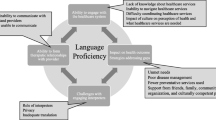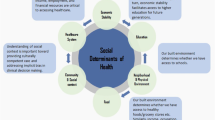Abstract
Per the behavioral model of health, help-seeking attitudes (and even behavioral health service use) are a function of predisposing and enabling individual characteristics (e.g. demographic characteristics, health beliefs), as well as contextual characteristics (resources, social structures such as education etc.). While researchers have examined how demographic (gender and ethnicity) and socioeconomic (education and income) characteristics, psychological factors, and internal barriers relate to help-seeking attitudes, the majority of these works have investigated how different variables independently act on help-seeking attitudes in lieu of more comprehensively investigating how they operate in tandem. The purpose of the current study was to examine how demographic (gender and ethnicity) and socioeconomic (education and income) characteristics, behavioral health factors, and internal barriers relate to help-seeking attitudes in a diverse sample of primary care patients. We also sought to examine differences in demographic and socioeconomic characteristics in mental health literacy, stigma, and help-seeking attitudes. Participants were 286 primary care patients. Results from this study indicate that a combination of socioeconomic characteristics (i.e. education), behavioral health factors (level of distress and history of behavioral health service utilization), and internal barriers (personal stigma) predicted help-seeking attitudes among primary care patients. There was an inverse relationship between education and personal stigma and help-seeking attitudes such that higher levels of education and higher levels of personal stigma were associated with more negative help-seeking attitudes.
Similar content being viewed by others
References
Andersen, R. M. (2008). National health surveys and the behavioral model of health services use. Medical Care, 46(7), 647–653. https://doi.org/10.1097/MLR.0b013e31817a835d.
Arora, P. G., Metz, K., & Carlson, C. I. (2016). Attitudes toward professional psychological help seeking in South Asian students: Role of stigma and gender. Journal of Multicultural Counseling and Development, 44(4), 263–284. https://doi.org/10.1002/jmcd.12053.
Bandelow, B., & Michaelis, S. (2015). Epidemiology of anxiety disorders in the 21st century. Dialogues in Clinical Neuroscience, 17(3), 327–335.
Barney, L. J., Griffiths, K. M., Jorm, A. F., & Christensen, H. (2006). Stigma about depression and its impact on help-seeking intentions. Australian & New Zealand Journal of Psychiatry, 40(1), 51–54.
Beck, A. T., Epstein, N., Brown, G., & Steer, R. A. (1988). An inventory for measuring clinical anxiety: Psychometric properties. Journal of Consulting and Clinical Psychology, 56(6), 893–897.
Benuto, L., Casas, J., & O’Donohue, W. (2018). Training psychologists to be culturally competent providers: A systematic review of the literature. Training and Education in Professional Psychology. https://doi.org/10.1037/tep0000190.
Benuto, L., Singer, J., Newlands, R., & Casas, J. (2019b). Training culturally competent psychologists-Where are we and where do we need to go? Training and Education in Professional Psychology. https://doi.org/10.1037/tep0000190.
Benuto, L. T., Gonzalez, F., Reinosa Segovia, F., & Duckworth, M. (2019a). Mental health literacy, stigma, & behavioral health service use: The case of Latinx and non-Latinx Whites. Journal of Racial and Ethnic Health Disparities. https://doi.org/10.1007/s40615-019-00614-8.
Berdahl, T. A., & Stone, R. A. T. (2009). Examining Latino differences in mental healthcare use: The roles of acculturation and attitudes towards healthcare. Community Mental Health Journal, 45(5), 393–403.
Bertakis, K. D., Azari, R., Helms, J. L., Callahan, E. J., & Robbins, J. A. (2000). Gender differences in the utilization of health care services. The Journal of Family Practice, 49(2), 147–152.
Cabassa, L. J., Zayas, L. H., & Hansen, M. C. (2006). Latino adults’ access to mental health care: A review of epidemiological studies. Administration and Policy in Mental Health and Mental Health Services Research, 33(3), 316–330.
Cheng, H., Wang, C., McDermott, R. C., Kridel, M., & Rislin, J. L. (2018). Self-Stigma, mental health literacy, and attitudes toward seeking psychological help. Journal of Counseling & Development, 96(1), 64–74. https://doi.org/10.1002/jcad.12178.
Cohen, J. (1988). Statistical power analysis for the behavioral sciences. New York: Routledge.
Conner, K. O., Koeske, G., & Brown, C. (2009). Racial differences in attitudes toward professional mental health treatment: The mediating effect of stigma. Journal of Gerontological Social Work, 52(7), 695–712. https://doi.org/10.1080/01634370902914372.
Davis, J. M., & Liang, C. T. H. (2015). A test of the mediating role of gender role conflict: Latino masculinities and help-seeking attitudes. Psychology of Men & Masculinity, 16(1), 23–32. https://doi.org/10.1037/a0035320.
Diala, C. C., Muntaner, C., Walrath, C., Nickerson, K., LaVeist, T., & Leaf, P. (2000). Racial differences in attitudes toward professional mental health care and in the use of services. American Journal of Orthopsychiatry, 70, 455–464.
Elhai, J. D., Schweinle, W., & Anderson, S. M. (2008). Reliability and validity of the attitudes toward seeking professional psychological help scale-short form. Psychiatry Research, 159(3), 320–329. https://doi.org/10.1016/j.psychres.2007.04.020.
Fischer, E. H., & Farina, A. (1995). Attitudes toward seeking professional psychological help: A shortened form and considerations for research. Journal of College Student Development, 36, 368–373.
Ghafoori, B., Fisher, D. G., Koresteleva, O., & Hong, M. (2014). Factors associated with mental health service use in urban, impoverished, trauma-exposed adults. Psychological Services, 11(4), 451–459. https://doi.org/10.1037/a0036954.
Gonzalez, J. M., Gon Zalez, J. M., Alegría, M., Alegría, M., Prihoda, T. J., Prihoda, T. J., … Zeber, J. E. (2011). How the relationship of attitudes toward mental health treatment and service use differs by age, gender, ethnicity/race and education. Social Psychiatry and Psychiatric Epidemiology, 46(1), 45–57. https://doi.org/10.1007/s00127-009-0168-4
Griffiths, K. M., Batterham, P. J., Barney, L., & Parsons, A. (2011). The generalised anxiety stigma scale (GASS): Psychometric properties in a community sample. BMC Psychiatry, 11(1), 184. https://doi.org/10.1186/1471-244X-11-184.
Griffiths, K. M., Christensen, H., & Jorm, A. F. (2008). Predictors of depression stigma. BMC Psychiatry, 8(1), 25. https://doi.org/10.1186/1471-244X-8-25.
Gulliver, A., Griffiths, K. M., Christensen, H., Mackinnon, A., Calear, A. L., Parsons, A., … Stanimirovic, R. (2012). Internet-based interventions to promote mental health help-seeking in elite athletes: an exploratory randomized controlled trial. Journal of Medical Internet Research, 14(3), e69. https://doi.org/10.2196/jmir.1864.
Jorm, A. F., Korten, A. E., Jacomb, P. A., Christensen, H., Rodgers, B., & Pollitt, P. (1997). “Mental health literacy”: A survey of the public's ability to recognise mental disorders and their beliefs about the effectiveness of treatment. Medical Journal of Australia, 166(4), 182–186. https://doi.org/10.5694/j.1326-5377.1997.tb140071.x.
Jung, H., von Sternberg, K., & Davis, K. (2017). The impact of mental health literacy, stigma, and social support on attitudes toward mental health help-seeking. International Journal of Mental Health Promotion, 19(5), 252–267. https://doi.org/10.1080/14623730.2017.1345687.
Keen, J., & Li, X. (2005). Age and gender differences in health service utilization. Journal of Public Health, 27(1), 74–79. https://doi.org/10.1093/pubmed/fdh208.
Kessler, R., Berglund, P., Demler, O., Jin, R., & Walters, E. (2005). Lifetime prevalence and age-of-onset distributions of DSM-IV disorders in the National Comorbidity Survey Replication. Archives of General Psychiatry, 62, 593–602.
Keum, B. T., Hill, C. E., Kivlighan, D. M., Jr., & Lu, Y. (2018). Group- and individual-level self-stigma reductions in promoting psychological help-seeking attitudes among college students in helping skills courses. Journal of Counseling Psychology, 65(5), 661–668. https://doi.org/10.1037/cou0000283.supp.
Kim, B. S. K., & Omizo, M. M. (2003). Asian cultural values, attitudes toward seeking professional psychological help, and willingness to see a counselor. The Counseling Psychologist, 31, 343–361.
Kim, J. E., & Zane, N. (2016). Help-seeking intentions among Asian American and White American students in psychological distress: Application of the health belief model. Cultural Diversity and Ethnic Minority Psychology, 22(3), 311–321. https://doi.org/10.1037/cdp0000056.
Leong, F. T. L., Kim, H. H. W., & Gupta, A. (2011). Attitudes toward professional counseling among Asian-American college students: Acculturation, conceptions of mental illness, and loss of face. Asian American Journal of Psychology, 2(2), 140–153. https://doi.org/10.1037/a0024172.
MacKenzie, C. S., Knox, V. J., Gekoski, W. L., & Macauley, H. L. (2004). An adaptation and extension of the attitudes toward seeking professional psychological help scale. Journal of Applied Social Psychology, 34(11), 2410.
Masuda, A., Anderson, P. L., Twohig, M. P., Feinstein, A. B., Chou, Y.-Y., Wendell, J. W., et al. (2009). Help-seeking experiences and attitudes among African American, Asian American, and European American college students. International Journal for the Advancement of Counselling, 31(3), 168–180. https://doi.org/10.1007/s10447-009-9076-2.
Masuda, A., & Boone, M. S. (2011). Mental health stigma, self-concealment, and help-seeking attitudes among Asian American and European American college students with no help-seeking experience. International Journal for the Advancement of Counselling, 33(4), 266–279. https://doi.org/10.1007/s10447-011-9129-1.
Mendoza, H., Masuda, A., & Swartout, K. M. (2015). Mental health stigma and self-concealment as predictors of help-seeking attitudes among Latina/o college students in the United States. International Journal for the Advancement of Counselling, 37(3), 207–222. https://doi.org/10.1007/s10447-015-9237-4.
Mojtabai, R., Evans-Lacko, S., Schomerus, G., & Thornicroft, G. (2016). Attitudes toward mental health help seeking as predictors of future help-seeking behavior and use of mental health treatments. Psychiatric Services, 67(6), 650–657. https://doi.org/10.1176/appi.ps.201500164.
Nam, S. K., Chu, H. J., Lee, M. K., Lee, J. H., Kim, N., & Lee, S. M. (2010). A meta-analysis of gender differences in attitudes toward seeking professional psychological help. Journal of American College Health, 59(2), 110–116. https://doi.org/10.1080/07448481.2010.483714.
Narendorf, S. C., Munson, M. R., Ben-David, S., Cole, A. R., & Scott, Jr., L. D. (2018). Race and gender differences in attitudes toward help seeking among marginalized young adults with mood disorders: A mixed-methods investigation. Psychiatric Rehabilitation Journal, 41(4), 277.
National Institute of Mental Health. (2017). Any Anxiety Disorder. Retrieved from: https://www.nimh.nih.gov/health/statistics/any-anxiety-disorder.shtml.
Obasi, E. M., & Leong, F. T. L. (2009). Psychological distress, acculturation, and mental health-seeking attitudes among people of African descent in the United States: A preliminary investigation. Journal of Counseling Psychology, 56(2), 227–238. https://doi.org/10.1037/a0014865.
Ojeda, V. D., & Bergstresser, S. M. (2008). Gender, race-ethnicity, and psychosocial barriers to mental health care: An examination of perceptions and attitudes among adults reporting unmet need. Journal of Health and Social Behavior, 49(3), 317–334. https://doi.org/10.1177/002214650804900306.
Omizo, M. M., Kim, B. S. K., & Abel, N. R. (2008). Asian and European American cultural values, bicultural competence, and attitudes toward seeking professional psychological help among Asian American adolescents. Journal of Multicultural Counseling and Development, 36(1), 15–28. https://doi.org/10.1002/j.2161-1912.2008.tb00066.x.
Ortega, A. N., & Alegría, M. (2002). Self-reliance, mental health need, and the use of mental healthcare among island Puerto Ricans. Mental Health Services Research, 4(3), 131–140.
Ramos-Sánchez, L., & Atkinson, D. R. (2009). The relationships between Mexican American acculturation, cultural values, gender, and help-seeking intentions. Journal of Counseling & Development, 87(1), 62–71. https://doi.org/10.1002/j.1556-6678.2009.tb00550.x.
Rüsch, N., Müller, M., Ajdacic-Gross, V., Rodgers, S., Corrigan, P. W., & Rössler, W. (2014). Shame, perceived knowledge and satisfaction associated with mental health as predic- tors of attitude patterns towards help-seeking. Epidemiol- ogy and Psychiatric Sciences, 23, 177–187. https://doi.org/10.1017/S204579601300036X.
Schnyder, N., Panczak, R., Groth, N., & Schultze-Lutter, F. (2017). Association between mental health-related stigma and active help-seeking: Systematic review and meta-analysis. British Journal of Psychiatry, 210(4), 261–261. https://doi.org/10.1192/bjp.bp.116.189464.
Selkirk, M., Quayle, E., & Rothwell, N. (2014). A systematic review of factors affecting migrant attitudes towards seeking psychological help. Journal of Health Care for the Poor and Underserved, 25(1), 94–127. https://doi.org/10.1353/hpu.2014.0026.
Topkaya, N. (2014). Gender, self-stigma, and public stigma in predicting attitudes toward psychological help-seeking. Kuram ve Uygulamada Eğitim Bilimleri, 14(2), 480–487.
Ward, E. C., Wiltshire, J. C., Detry, M. A., & Brown, R. L. (2013). African American men and women’s attitude toward mental illness, perceptions of stigma, and preferred coping behaviors. Nursing Research, 62, 185–194. https://doi.org/10.1097/NNR.0b013e31827bf533.
Wells, A., Wells, A., Lagomasino, I. T., Lagom Asino, I. T., Palinkas, L. A., Palinkas, L. A., … Gonzalez, D. (2013). Barriers to depression treatment among low-income, latino emergency department patients. Community Mental Health Journal, 49(4), 412–418. https://doi.org/10.1007/s10597-012-9547-5.
Wheaton, M. G., Sternberg, L., McFarlane, K., & Sarda, A. (2016). Self-concealment in obsessive-compulsive disorder: Associations with symptom dimensions, help seeking attitudes, and treatment expectancy. Journal of Obsessive-Compulsive and Related Disorders, 11, 43–48. https://doi.org/10.1016/j.jocrd.2016.08.002.
Wright, A., Jorm, A. F., Harris, M. G., & McGorry, P. D. (2007). What's in a name? Is accurate recognition and labelling of mental disorders by young people associated with better help-seeking and treatment preferences? Social Psychiatry and Psychiatric Epidemiology, 42(3), 244. https://doi.org/10.1007/s00127-006-0156-x.
Author information
Authors and Affiliations
Corresponding author
Additional information
Publisher's Note
Springer Nature remains neutral with regard to jurisdictional claims in published maps and institutional affiliations.
Rights and permissions
About this article
Cite this article
Benuto, L.T., Casas, J., Gonzalez, F. et al. The Behavioral Model of Health: Education, Behavioral Health Factors, and Stigma as Predictors of Help-Seeking Attitudes. Community Ment Health J 56, 1275–1283 (2020). https://doi.org/10.1007/s10597-020-00601-y
Received:
Accepted:
Published:
Issue Date:
DOI: https://doi.org/10.1007/s10597-020-00601-y




